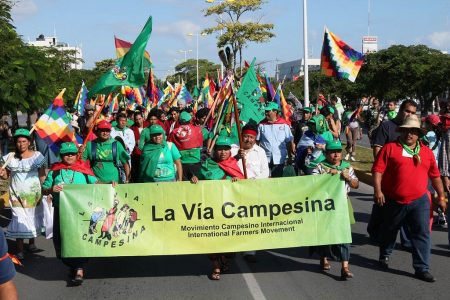“A great step forward for all humanity”
Meaning and projection of the Declaration on the Rights of Peasants, by Diego Montón
The adoption by a very large majority of the United Nations General Assembly of the Declaration on the Rights of Peasants and other people working in rural areas represents “a great step forward for all humanity” that “ratifies and prioritizes” the family, peasant, and indigenous agricultural production as a key to the future. A future with rights.
The Declaration recovers the concept previously gathered by United Nations agencies that “peasant agriculture, fishing and small-scale livestock can contribute to ensure sustainable food production for all.”
On Article 1, the document defines that “a peasant is any person who engages or who seeks to engage alone, or in association with others or as a community, in small scale agricultural production for subsistence and/or for the market, and who relies significantly, though not necessarily exclusively, on family or household labour and other non-monetized ways of organizing labour, and who has a special dependency on and attachment to the land.”
The article adds that the term peasant “applies to any person engaged in artisanal or small-scale agriculture, crop planting, livestock raising, pastoralism, fishing, forestry, hunting or gathering, and handicrafts related to agriculture or a related occupation in a rural area.”
The Declaration also highlights the right of the peasants to biological diversity, the free choice of seeds to be cultivated, the protection of values in agriculture and caring for the environment.
Diego Montón, with the Argentinian Movimiento Nacional Campesino and one of the members of the Vía Campesina International representation team in this line of construction within the framework of the United Nations, gave his testimony to RWR and drew up the lines of action of the organization once the objective of the Declaration is achieved.
Diego highlights the broad majority reached for this Declaration to become a new instrument of global governance arranged by the United Nations, and its place in the scope of the Sustainable Development Goals for 2030.
Access to farmland, not being expelled from the territories in which they live and produce, as well as not being criminalized or threatened, are highlighted as some of the essential rights achieved to be explained in the document by Diego Montón.
With a view on “the day after” the approval of the Declaration, the agriculturer from Mendoza stresses that the basis of support for the struggle for the Declaration went far beyond the farming world and included fishers and pastoralist communities, among others.
“There is a stage of great diffusion and grassroots work, as well as dialogue with governments about this Declaration,” says Montón in his message to RWR. And he mentioned the commitment of the government of the Plurinational State of Bolivia and its president Evo Morales, to promote the debate in the Human Rights Council and the General Assembly of the United Nations.
